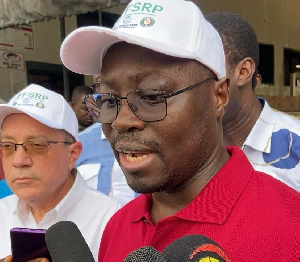Ho, April 2, GNA - The Ministry of Tourism and Modernisation of the Capital City have called for the re-introduction of authentic highlife music into the Ghanaian entertainment industry.
"Ghana was a country known for its highlife music and many musicians and music lovers all over the world in the past invaded the country to enjoy it, unfortunately Ghana is gradually losing catalytic effect of the highlife," Mr Jake Obetsebi-Lamptey the sector minister stated at a workshop at Ho on Friday.
The workshop on the theme: "Mainstreaming Music in Ghana's Poverty Reduction Strategy Programme" was organised jointly by the World Bank, Institute for Music and Development, a non-governmental organisation, the Goethe Institute, the French Embassy in Ghana and other social partners.
Mr Obetsebi-Lamptey noted the urgent need for the development, promotion and sustenance of the music industry in the country and the protection and preservation of national cultural heritage for posterity. He suggested the development of a human resource base of musicians, adoption of anti-piracy laws and mechanisms, strengthening of distribution channels and access to the market, enhancement of the quality of music labelling and the avoidance of the usage of profanity in music.
The Tourism Minister urged the music industry to take substantial contribution to the national economy and play a catalytic role in the growth and development of other businesses.
Speaking on "The Current Situation of the Music Industry in Ghana," The President of Musicians Union of Ghana (MUSOGA), Alhaji Sidiku Buari said the industry is bedevilled with exploitation, piracy, bad contractual agreements, financial handicaps, poor marketing avenues and massive fraud perpetuated by Disc Jockey (DJs) of most radio stations. He also debunked the notion that music industry is only good for societal mist-fits is unfortunate described it as bane on the development of the Ghanaian music industry.
Alhaji Buari called on the Ministry of Tourism to include the development of music in its policy direction towards making tourism the number one foreign exchange earner in the country.
He also commended the Institute for Music Development's proposal for the establishment of Ghana Music Industry Development Council, which would be used as a platform for providing research, development and production of support to musicians and to lead in creating enabling environment for the growth of the industry.
In a 10-bullet point, Professor John Collins of the University of Ghana diagnoses the contrast between music and poverty alleviation. He identified: "Music as a tool for a boom in the tourism industry, Music as central to many types of income generation, music as an export commodity for the international market, music as royalty generation for both home and abroad, Music as means for seeking sponsorship.
The rest were: "Social welfare and life insurance functions of bands, developmental themes in music lyrics, music as a general educational toner, music as economic avenue for women and musical social commentary by the under-privileged."
Togbe Afede XIV, Agbogbomefia of Asogli State chaired the workshop which was attended by officials from the Musicians Union in Ghana, Producers, Copyrights Officers, Journalists, Educationist, Academia and other stakeholders in the music industry.
The World Bank and its development partners in Ghana and officials from the National Development Planning Committee (NDPC) were also present.
Entertainment of Saturday, 2 April 2005
Source: GNA












